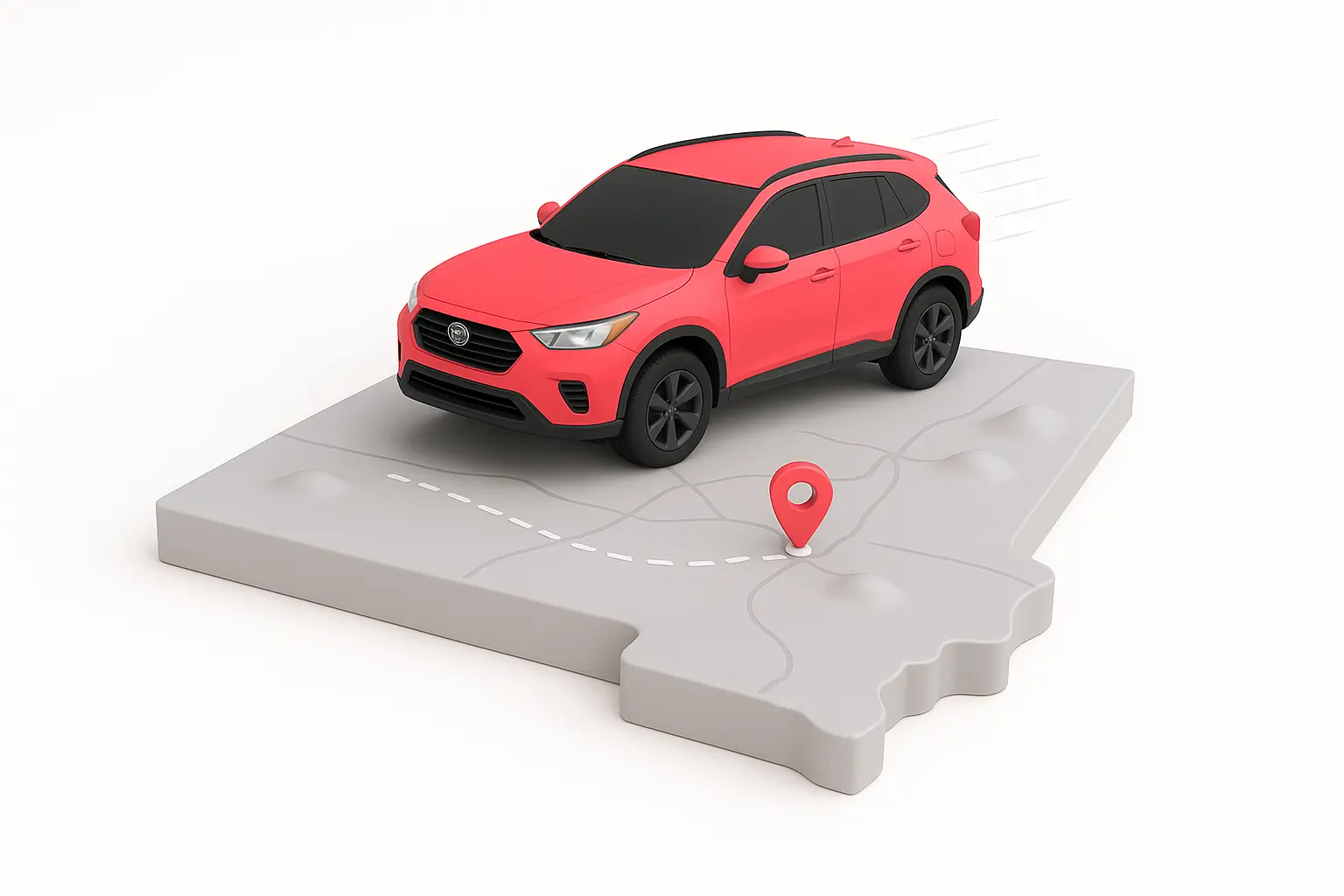That range covers both parts and labor—including the fuel filter labor cost—and reflects how access, vehicle design and fuel type drive the overall repair bill.
Searching “fuel filter replacement near me”? The Jerry app can deliver accurate, local quotes in minutes and improve your repair experience.
Real customers Jerry helped
While pricing can vary based on different factors like location, parts used, and exact vehicle, Jerry shows what drivers are paying right now. Here are some examples of real customer repairs:
Estimates are modeled based on real vehicle and location data; names have been changed. Actual prices will vary by shop, parts, and vehicle condition.
What is a fuel filter?
Think of the fuel filter as the bodyguard for your injectors. It catches contaminants (and separates water in diesels) before they reach the pump or nozzles — keeping fuel delivery stable and injectors spraying evenly.
Common setups:
- Inline/underbody filters: Cylindrical canisters in the line near the tank or frame rail. Usually use quick-connects or flare nuts; note flow-direction arrows and O-ring lube.
- Engine-bay filters: Mounted near the firewall or fuel rail. Easy access, but brittle plastic fittings or banjo bolts require new washers.
- In-tank strainers/integrated filters: At the pump pickup inside the tank. Marketed as “lifetime” but still clog from contamination. Access varies from rear seat hatches to tank drops.
- Diesel filters: Larger, dual-stage cartridges with water separation. Proper priming is essential after replacement.
Signs you need a fuel filter replacement
A fuel filter usually degrades slowly, so symptoms creep in. Jerry customers are seeing these common warning signs:
- Hesitation, stumbling or stalling under load or uphill.
- Loss of power at highway speeds or while towing.
- Hard starting or long crank, then smooth idle.
- Whining fuel pump, lean codes (P0171/P0174) or rail pressure codes (P0087/P0191).
- High positive trims under load.
- For diesels: Water-in-Fuel warning, rough running past the filter interval.
- After bad fuel: debris in the old filter.
Many vehicles don’t set a specific “fuel filter” code — diagnosis usually relies on pressure/volume tests and ruling out ignition/airflow issues.
Cost breakdown: Why the price varies
Fuel filter jobs look simple, but Jerry customers find a few variables swing the total. Here’s what drives cost:
Vehicle design and filter location:
Inline or engine-bay filters are quick access; underbody filters may require lifting the car and fighting rusty fittings. Expect 0.5–1.0 hour for accessible filters vs. 1.0–2.0+ hours for shielded or hidden setups — a ~$60–$200 labor swing.
In-tank “filter” (pump module):
Many modern vehicles use an in-tank strainer integrated with the fuel pump. Access may require dropping the tank or pulling a rear seat. Labor can double and many filters aren’t sold separately — forcing full module replacement (+$150–$400+).
Gas vs. diesel:
Diesel systems use larger, dual-stage filters with water separation and require priming. Parts often cost $50–$150, with an extra 0.3–0.6 hr labor (~$40–$120) compared to a gas inline filter.
Parts quality and brand:
Original equipment manufacturer (OEM) filters cost more. On gas filters, expect $15–$30 aftermarket vs. $30–$70 OEM. Diesel/Euro OEM often exceeds $100. Trusted brands include Mahle, Mann, Bosch, OEM (gas/Euro); Racor, Fleetguard, Motorcraft, ACDelco (diesel). Avoid no-name e-comm specials.
Condition of fittings and lines:
Corroded quick-connects or frozen flare nuts can turn a 30-minute job into a 90-minute fight. If a line/connector breaks, add $20–$150 in parts and another 0.5–1.0 hr labor.
Regional labor rates:
Urban/coastal markets often run $130–$200/hr. In smaller markets, expect $90–$140/hr.
Add-on services and contamination:
If debris or bad fuel is found, a shop may recommend draining the tank, replacing lines or cleaning injectors ($80–$300+). Always ask for photos and test results before approving extras.
Safety and depressurization:
Properly releasing fuel pressure, priming and checking for leaks adds 0.2–0.4 hr. Special note: never crack open gasoline direct injection (GDI) high-pressure lines (can exceed 500–2,900 psi).
Your action plan: How to save money
Keep this repair straightforward with a mechanic’s playbook:
Confirm the diagnosis:
A clogged filter can mimic a weak pump or bad mass air flow (MAF) sensor. Have the shop record fuel pressure/volume, trims and codes. Red flags include P0087/P0191, high positive fuel trims (+12–20%), low volume with OK pressure, noisy pump or high pump current. The Jerry app’s diagnostic tool can provide further insight as well.
Know your design:
Check if your vehicle uses a serviceable inline filter or an in-tank strainer. Ask if the filter is sold separately from the pump, and whether access is through a hatch or requires dropping the tank.
Choose the right part:
For GDI and diesel, use OEM or trusted brands (Mahle/Mann/Bosch; Racor/Fleetguard/Motorcraft/ACDelco). Match the OEM micron rating to protect injectors.
Time it with service:
If the interval is due, pair it with other undercar or diesel service to save on setup time.
Ask about rusty fittings:
In Rust Belt regions, pre-soaking fittings and replacing brittle connectors prevents broken lines and costly delays.
Avoid guesswork on add-ons:
Request before/after fuel pressure readings, photos of debris/water and a clear line-item plan for seized fittings. Approve extras only with evidence.
Check for recalls:
Some pump module or fuel line recalls overlap with filter issues.

DIY vs. Pro: Can I do this myself?
A fuel filter looks simple, but pressurized fuel and corroded fittings raise the stakes. Jerry’s insights into parts and labor rates can help you take the right approach:
| Factor | DIY Considerations | Pro Shop |
| Skill level | Intermediate for inline; advanced for in-tank modules | Pros handle tricky access and model quirks |
| Tools | Line wrenches, disconnect tools, jack/stands, catch pan, pressure gauge | Lifts, OE tools, fire-safety gear |
| Time | 30–90 min (inline); 2–4+ hrs (in-tank) | Faster, repeat experience |
| Safety | Must depressurize, eye protection, Class B extinguisher; never open GDI high-pressure lines | Controlled environment, leak checks |
| Diesel priming | Must prime/bleed properly or risk a no-start | Quick and proven priming procedures |
| Risk of mistakes | Stripped fittings, leaks, tow bills | Warranty on parts and labor |
Pro tips if you DIY:
- Work cold and outdoors.
- Disconnect the battery.
- Depressurize by pulling the pump fuse and running to stall.
- Keep an extinguisher nearby.
- Lube O-rings.
- Follow flow arrows.
- Check for leaks after service.
Related repairs
Fuel delivery is a system. If the filter is clogged, Jerry customers are seeing that other parts may also need attention:
- Fuel pump replacement: A clogged filter overworks the pump. If noisy or pressure is low, both may be replaced ($400–$1,100+).
- Fuel lines/connectors: Old quick-connects can crack or leak after service ($50–$250).
- Injector cleaning/service: If debris bypassed the filter, ultrasonic cleaning or replacement may be needed ($100–$200).
- Tank drain/clean: Prevents re-clogging after contaminated fuel ($100–$300+).
- Fuel pressure regulator or sensor: Lean/pressure codes may also implicate these components.
Ready to move from research to repair? Compare shop quotes, check recalls, and book your fuel filter replacement confidently in the Jerry app.
What our customers are asking
-
Is it safe to keep driving with a clogged filter?
-
How often should I replace a fuel filter?
-
Can a clogged fuel filter damage the fuel pump?
-
How long does replacement take?
-
Will a clogged filter trigger a Check Engine Light?
-
Do diesels require priming after filter replacement?
-
Should I choose OEM or aftermarket?

Spencer Clayton is a mechanic, writer and fabricator who has hands that know their way around engines and a passion for storytelling. He’s diagnosed complex faults, built high performance engines and custom fabricated everything from fine detail parts to entire chassis while sharing how things work and why they matter. His background in everything from dealership technician work to building high performance cars spans a large breadth of experience, and he is driven by a love of all things automotive and a desire to share knowledge.

Steve Kaleff began working on cars at the very young age of nine years old, when his dad actually let him make fixes on the family car. Fast forward to the beginning of a professional career working at independent repair shops and then transitioning to new car dealerships. His experience was with Mercedes-Benz, where Steve was a technician for ten years, four of those years solving problems that no one could or wanted to fix. He moved up to shop foreman and then service manager for 15 years. There have been tremendous changes in automotive technology since Steve started his professional career, so here’s looking forward to an electric future!

Nick Wilson is an editor, writer, and instructor across various subjects. His past experience includes writing and editorial projects in technical, popular, and academic settings, and he has taught humanities courses to countless students in the college classroom. In his free time, he pursues academic research, works on his own writing projects, and enjoys the ordered chaos of life with his wife and kids.









